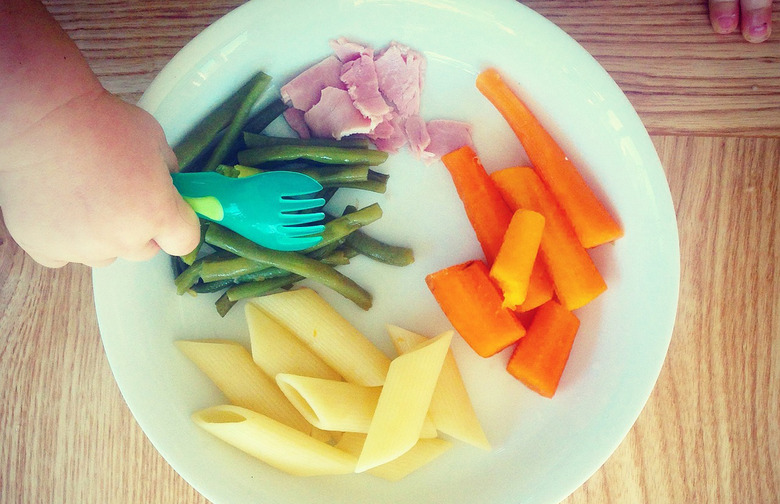How To Feed Your Baby Now To Prevent Picky Eating Later
We spoke with Alan Greene, MD and pediatric advisor for Plum Organics, about which foods to avoid feeding your baby and simple ways to set your baby up for healthy life, starting with their diet.
Tip #1: Build Nutritional Intelligence
"Exposing little ones to exciting flavors, textures, shapes and colors of different foods from the very first bite can shape their palates and preferences towards healthy foods for life," Greene said. "It builds their nutritional intelligence, which is the ability to recognize and enjoy healthy amounts of good food."
Tip #2: Don’t Give Up
"When all else fails, try, try, and try again," Greene said. "On average, it takes six to 10 tries for a baby to learn to like an unfamiliar food. Sometimes, it takes up to 15 tries. Don't give up! Introducing new foods isn't about learning what your baby likes — it's about teaching her what to like."
Tip #3: Distract Your Baby
"Hand your baby a spoon so they have one to control while you slip a spoonful of food in their mouth," Greene said. "Sometimes that will do the trick."
Tip #4: Go Crazy with Flavor
"Don't be afraid to incorporate herbs, spices, and lots of color, too," Greene suggested. "Babies can enjoy a wide-range of flavors from an early age, and exposure to wholesome, nutrient-rich foods can help create healthy eaters for life."
Tip #5: Influence Your Baby’s Palate the Healthy Way
"There's a window in time between when babies sit up and when they learn to walk that, if they're exposed to a flavor, and if they sample that flavor on average six to 10 times, there's a high likelihood they will learn to love that flavor," Greene said. "Bland, white cereals, and single ingredient purées won't satisfy baby's palate or nurture palate development. Make her first food a whole food, and don't be afraid to experiment!"
Tip #6: Start with Whole Foods
"Great first foods include whole grains like brown rice, quinoa or oats, avocado, sweet potato, organic whole-milk yogurt, or even cooked wild salmon or grass-fed organic meat and poultry," Greene said.
Tip #7: Try Finger Foods
"Feed them things they can manage themselves, like a baby food pouch," Greene said. "Pouches are a great transition food because babies can pick them up and feed themselves — and unique ingredient combinations can help them learn to love new flavors. You can also try taking something hard and grate it to help introduce them to different textures, like grated apple and grated carrot, which is small enough that they can pick it up and grab it with their fingers, but not large enough to be a choking hazard."







